Stacey Abrams and the Art of Ambition
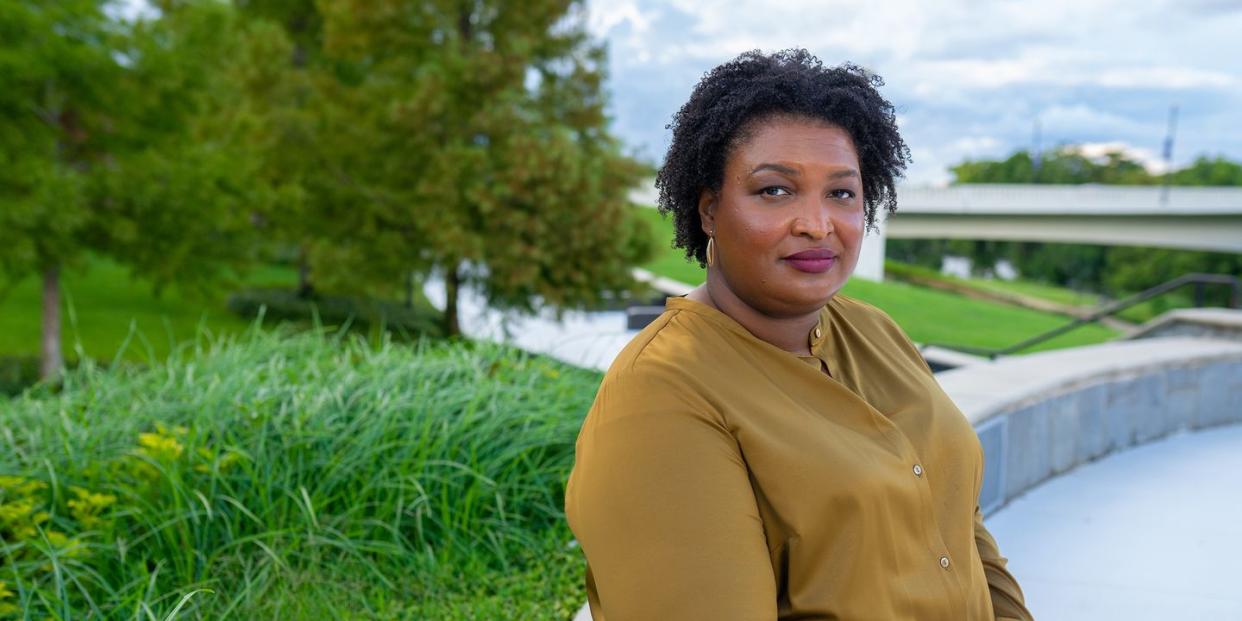
- Oops!Something went wrong.Please try again later.
- Oops!Something went wrong.Please try again later.
Stacey Abrams believed the Georgia state House Speaker was wrong, but no one dared to challenge him—except her.
It was a busy day in the House chamber in the spring of 2010, when tax bills were being introduced that Abrams, then the representative of House District 84, says were designed to benefit the wealthy and disadvantage the poor. She observed a few procedural steps being skipped over to push the legislation through. Believing that the Republicans, who have been in control of the House for some time, had not followed the rules, she decided to challenge the House Speaker, David Ralston, for not properly enforcing them—unbeknownst to her colleagues. It was difficult for Democratic leaders to challenge the Speaker, fearing it would jeopardize what little influence they had by pissing him off. Not Abrams.
“This was going to have a massive impact that hurt a lot of people,” she told Oprah Daily during a campaign stop last July in southeastern Georgia, the state where she’s running for governor again. “So I challenged the ruling of the chair, which means I basically stood up and said he was wrong. And when you do that, it then has to go to a vote. So the Speaker has to stand there while the members of the legislature tell him he’s wrong. This is a man who decides the committees you serve on, the parking spaces you get, everything. So when I challenged him, the response was Biblical. It took everyone aback. A few folks voted with me, but most people didn’t.”
Carolyn Hugley, who was the minority whip at the time and still represents House District 136, said everyone praised Abrams’s chutzpah but wished she had warned them first. “The [minority] leader looked at me,” she said. “I looked at him like, Okay, what are we going to do with this? Because the Speaker thinks it’s embarrassing for somebody to challenge his ruling. So it was interesting. But from that point on, everybody knew who Stacey was and that she was going to be a force to be reckoned with.”
This move could have easily tanked Abrams’s career trajectory because she was a bit of a pariah after that. According to Abrams, a representative who had challenged the ruling of a previous Speaker was stripped of his leadership role, lost his committee assignments, and had his seat in the chamber moved to the very back. Abrams even wrote to the state’s then attorney general to consult on the legalities of her move. But Ralston and the Republicans disagreed, and the legislation was voted into law; Abrams’s challenge did not survive the final vote. (Ralston declined to comment for this article.)
Looking back on that decision more than 12 years later, Abrams has no regrets. She would go on to win the minority leadership role a year later and learned how to plan bold moves with her colleagues as she negotiated tough choices for her party over the next six years. “For me, courage is what you do with the things that may seem small but are the core principles and values that you hold,” she says. “And for me, it wasn’t right. We weren’t following our own rules, and we were changing people’s lives.”
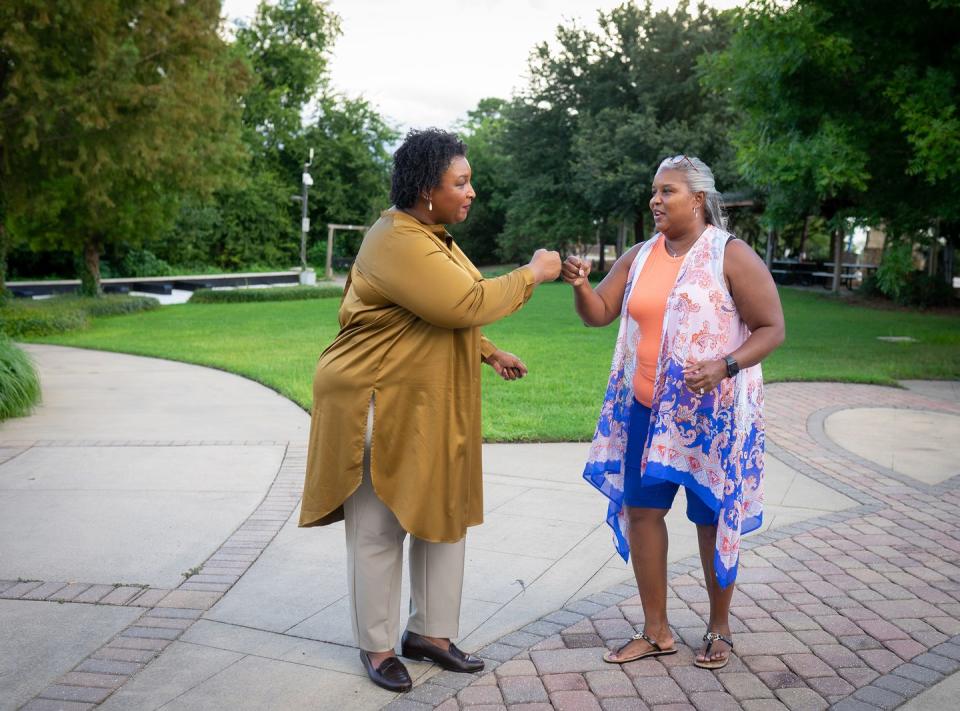
A Personal Mission
No matter where you go around Georgia, someone has a similar story about Abrams going above and beyond to help the most marginalized in her state—even when she is politically outnumbered and unlikely to win. She shows up for the fight anyway; in this case, risking her own political capital.
After losing the 2018 gubernatorial race by fewer than one and a half points to current Georgia governor Brian Kemp, she never stopped serving the public. During my time with her on the campaign trail, one weekend last July while she was campaigning in southwest Georgia, folks regularly referred to her as “Governor,” a sign of respect and a bitter reminder of the rampant allegations of voter suppression from four years ago that Abrams and other organizations are still fighting. When she isn’t helping folks make ends meet, she’s crisscrossing the country raising millions of dollars for Fair Fight, her Georgia-based civil rights organization that promotes fair elections around the nation and mobilizes new voters to the polls. As she sees it, all these projects, including winning the governorship, is preparing her for the seat she covets most: the one behind the desk inside the Oval Office in the White House.
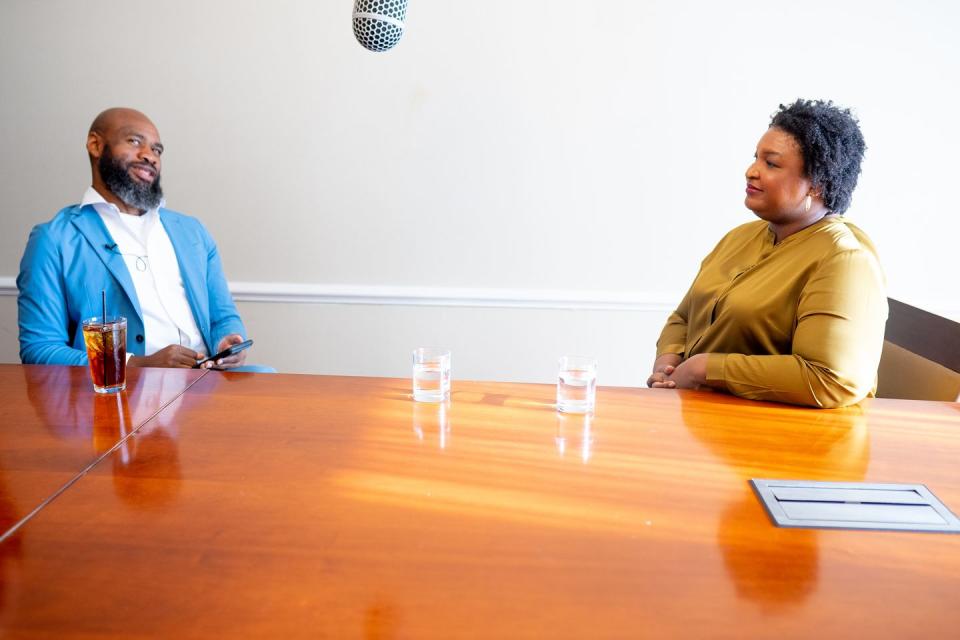
“Wanting to be president came about because I believe in ambition,” Abrams told me during a campaign stop in Albany, in southwest Georgia. “For so long, women, people of color, especially Black women, were told ambition was something we weren’t entitled to. When I think about helping people, my fundamental question is, ‘How can I help?’ The job in this world that has the greatest reach and the deepest capacity is the job of president. So yes, I want that job one day, but I don’t want that job to the exclusion of all else. There are other jobs I want to do along the way, because those jobs have very specific roles to play and ways to change and shape the world.”
Few Black women have navigated the political landscape as expertly as Abrams, who is vying to be the first Black female governor of any state in the nation. Usually when Black women run for office, they are short on cash. Most can barely hire a campaign manager, let alone a full-time staff that can cover the entire state. Back in 2018, Abrams’s campaign raised $42 million; since December, her 2022 campaign has already reached $85 million, according to publicly available numbers. In the past three-month fundraising cycle, she raised more than $36 million, compared with $28.7 million for Kemp.
Most people who are able to haul in that type of green come from money, but Abrams is a standout exception. As a teenager in Mississippi, before she and her family moved to Georgia, she remembers her parents traveling across the state to different churches to convince congregations to give them money to build an ecumenical church inside a state prison. “I watched my dad go into these spaces where he wasn’t expected, talked to communities that didn’t think they cared. And he and my mom together raised this money and did it not by compromising who they were, but by being really clear about what they were trying to do.”
Her knack for convincing people to dole out cash was further honed at Spelman College. Johnnetta Cole, then president of the institution for Black Women, allowed Abrams to sit in her office as she made fundraising calls. Sometimes, Abrams would attend Spelman fundraisers to watch how Cole wooed potential donors and sit in board meetings. “You start to pick up things,” Abrams said.
Her Black minister parents and her Black school experience often come up during stump speeches, no matter the racial makeup of the audience. In fact, Abrams never forgets to mention them, partly because she is proud of being a Spelmanite and the faith her parents instilled in her. But the tributes also signal to women of color that they can succeed in politics without having to compromise themselves.
“My parents were doing good for communities that were left out. Johnnetta Cole was raising money to educate Black women, to own their power. I’m raising money to help lift up communities that have been left out and left behind. And that’s righteous to me. So I don’t mind raising the money because I know why I’m doing it. And I know that I can be myself as I do it.”
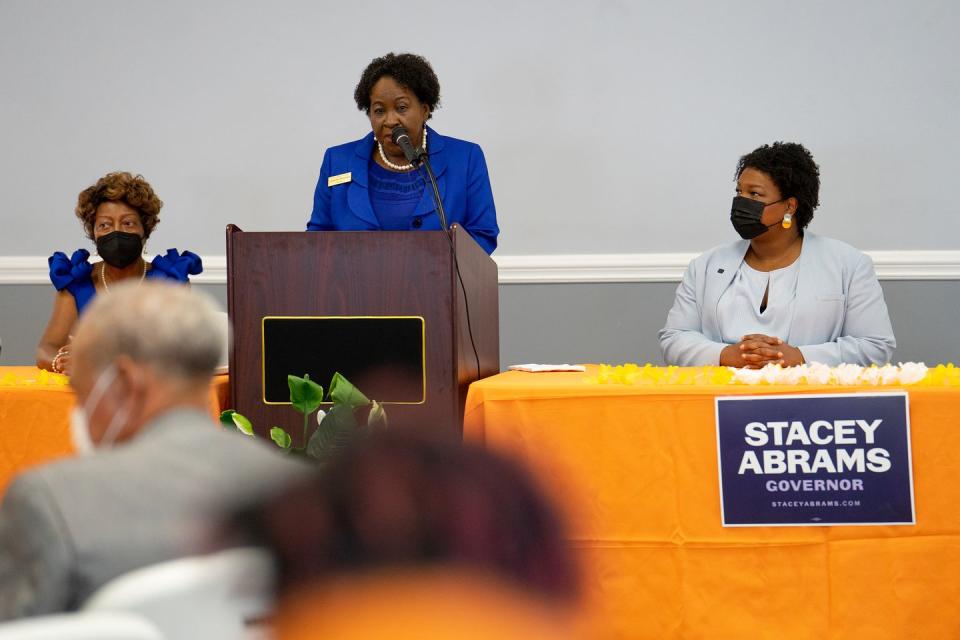
Sharing Her Vision
“I am so very happy that Ms. Abrams didn’t think it was robbery to come to a little rural Georgia town—as we call it, what?” Annette Morman, the town’s mayor, asked the mostly Black audience of roughly 70 people seated at the town’s community center.
“B-G,” they said in response.
“The B-G. Baconton, Georgia,” Morman reiterated. “We thank you from the bottom of our hearts, Ms. Abrams, for coming to Baconton, Georgia.”
It’s a constant refrain in these parts of the state, especially here in the southwestern corner. The counties lean red, but many of their inhabitants are Black folks (and, slowly, Latinx and other people of color) who feel Democrats don’t court them because they see these areas of Georgia as unwinnable. Morman wasn’t finished.
“It began on January the 20th, 2009, at approximately 12 noon,” she continued. “The 44th president began his walk to the platform to become the new and the first Black president of these United States of America. In January 2023, we do expect the new and first Black governor of the state of Georgia, Ms. Stacey Abrams.”
When Abrams took the podium, she started her speech like she does so many others, by listing all the issues she’s fighting for: healthcare access, increasing salaries for state employees—including police officers, eschewing calls for defunding the police—increasing broadband, and creating more jobs in the state. But where you see her political skill in action is when she delves into touchy but unavoidable subjects, like abortion access. While she supports a woman’s right to choose and is firmly aware that the Supreme Court’s ruling disproportionately disadvantages Black women, Abrams knows where she is. Baconton is as Bible Belt as you can get. It’s one of those places where folks clutch their Bibles in one hand and swat away insufferable gnats (the locals call the pesky insects the “welcoming committee”) with the other, when they aren’t church fanning themselves in this oppressive heat.
Instead of delving into the landmine-ridden labyrinth of religion that pervades the subject, she argues that the SCOTUS ruling infringes on their civil rights.
“I'm running for governor because I believe in the capacity of Georgia, in the possibility of Georgia, in the future of Georgia,” she told them. “But I’m also running because I’m worried about this country. You see, regardless of where you stand on the issue of abortion, the right to choose should not be a debate. This is about being able to take care of your body.”
“That’s right!” one woman said, as the audience applauded.
“And for those who are still skeptical, let me tell you, this is a medical decision. I have a friend who sent me a note yesterday. She had written an essay, and she said, ‘I've had two abortions. They were called spontaneous abortions because they were miscarriages. But under the laws in the state of Georgia, I could be investigated and accused of a crime because I had a miscarriage in the state of Georgia.’ So those of you who think that this law doesn’t have any effect, this is the criminalization of a woman’s body.”
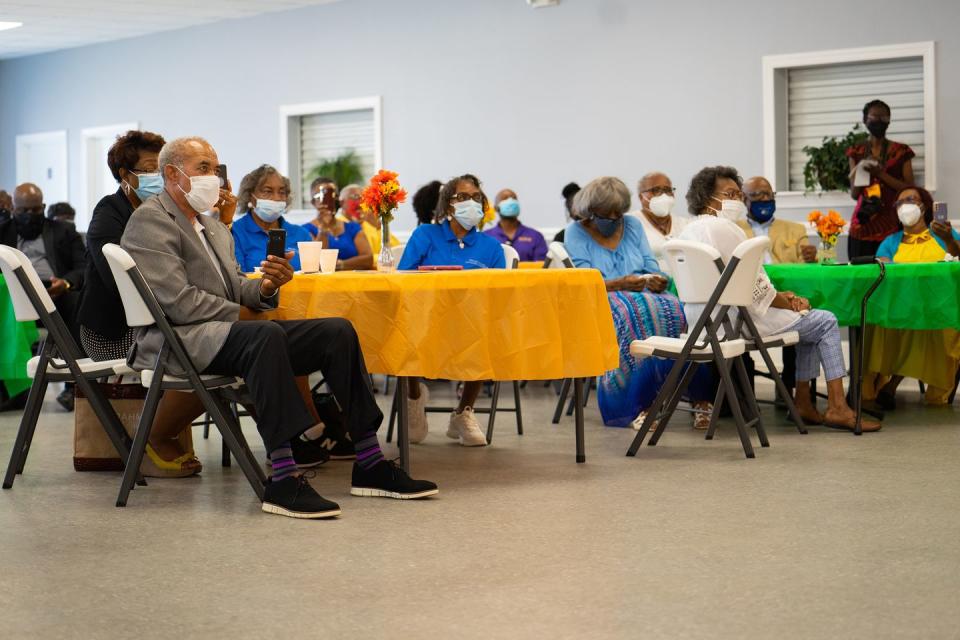
An Inclusive Strategy
After Abrams finished and took some questions, some of her former state legislature colleagues who are still working in Atlanta hung around to chat with her over refreshments. One of them, state senator Freddie Powell Sims, told me that Abrams had this natural talent of negotiating with Republicans whose values she’d never share, but she had the stomach to do so because she was shrewd in her resolve to squeeze the most out of the ruling party—even when she knew it wouldn’t be much. When it was time to spar over policy, Sims says she often found few people who wanted to square up with her.
“Nobody wanted to debate her, because they couldn’t win,” Sims remembers.
Back in 2018, Kemp won Mitchell County, where Baconton sits, by more than 13 points. That figure is somewhat misleading. Besides the large metropolitan areas in the state, most of Georgia’s counties are red, and even on her best election night, Abrams won’t win most of them. But she doesn’t have to.
“If she’s going down there and she’s picking off 45 to 49 percent of the voters in the best-case scenario, even 35 to 40 percent, that damages their coalition because they're not going to be able to match the numbers in the urban cities: the Savannahs, the Columbuses, the Macons, the Augustas, the Atlantas,” said Anré Washington, the Atlanta lawyer who also managed Congresswoman Nikema Williams’s 2020 campaign to replace the late John Lewis. “So it matters for her to be down there building those coalitions.”
Morman knows that winning her county will be rough. It’s been red for so long that a lot of folks have simply accepted it will always be that way. “But maybe we can change that,” Morman said. “Like we changed Georgia,” referring to how Biden won the state in 2020.
I asked Sims, who worked with Abrams in the Georgia legislature, if she believes Trump’s influence will help determine the outcome of the gubernatorial race. The question frustrates her because she feels the media elected him in the first place. “If the media would forget about him, that would make him go away,” she said. “But the media continues to bring him on the news every day. That emboldens him. There are so many other things we can talk about other than Trump and Trumpism.”
That said, it’s difficult to ignore the ex-president’s influence. A dangerous element of Trumpism and the right-wing extremism he fans has been the death threats against progressive politicians. Pretty much all the House members who make up “the Squad” have had to up spending on private security because of rising death threats. FBI agents foiled a kidnapping attempt of Governor Gretchen Whitmer of Michigan while she was at her vacation home in 2020; earlier that year, armed vigilantes stormed the state capitol over Whitmer’s stay-at-home orders to prevent the spread of Covid-19.
Back in 2018, extremists threatened violence against Abrams if she won. The threats have not abated. Last year alone, a political PAC tied to Abrams spent more than $1.4 million on private security. She said because she is battling the ideology of voter suppression, it’s evoking the very worst in people who don’t want equitable politics in Georgia. After she started Fair Fight in 2019, that’s when she said the threats skyrocketed, requiring her to hire private security.
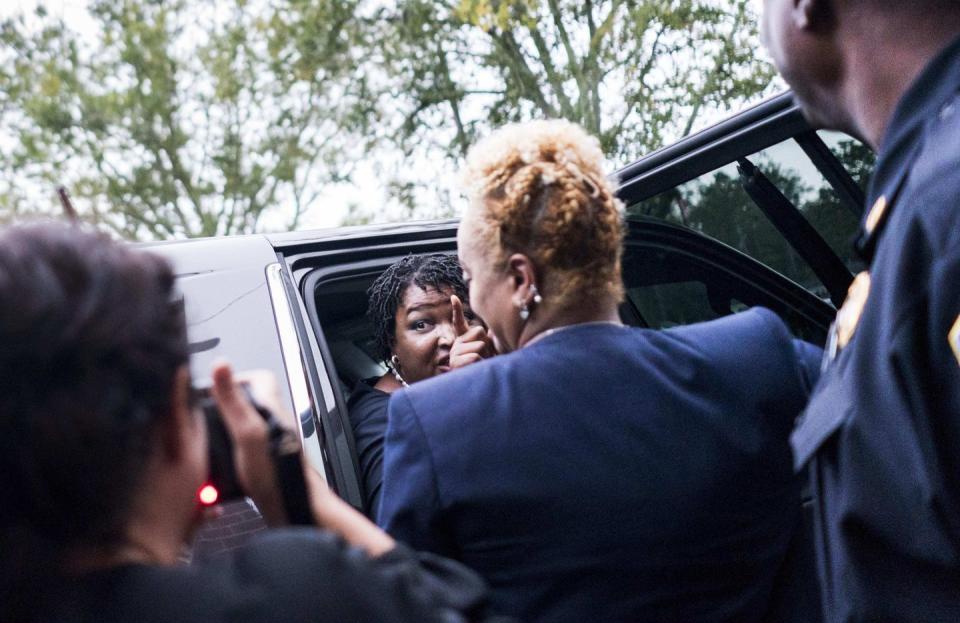
“Being a private citizen, I was responsible for my own safety,” she said. “And [my campaign has] continued to take that very seriously. I also understand when you challenge power structures, especially power structures as entrenched as those who promote voter suppression, you are challenging not just that act but an entire ideology. There are those who are going to respond in kind by saying you are wrong for doing so. What Michigan Governor Gretchen Whitmer had to withstand, she’s been able to withstand in part because she has the protection of the state. I do not. Until I became the [Democratic gubernatorial] nominee, I was on my own.”
Fox News, erroneously, of course, has criticized Abrams for spending tax payer money on security, without citing their own culpability in fanning the flames of hateful rhetoric directed at her. That aside, many take for granted that she’s able to crusade for a more democratic Georgia in the first place. Virtually no one else–even most white men–would be able to duplicate the safety measures she’s able to employ for herself.
Kiah Morris, a former Black female state representative in Vermont, quit her seat in 2018 because she could no longer handle the racial abuse and death threats hurled at her. Over the past six years, Black women have won electoral office in record numbers, but many of them don’t feel safe after taking their oaths. PBS News Hour reported in 2021 that of the 18 Black female politicians they spoke with about the challenges of being into elected office, only one of them did not report racist or sexist abuse.
How does Abrams deal with the nonstop onslaught of racism and sexism? What makes her push through the abuse?
“My responsibility is to run the campaign that actually lifts the most people and to do the work that gets me the job,” she told me. “I have three extraordinary sisters who have very different personalities, but they are my safe space. My mom and my dad love me and right now are temporary residents in my house, which means I get in-home pastoral care, because they're both ministers, whether I want it or not. I think part of the notion of self-care is to constantly remind yourself of who you are and why you do this. This is not for popularity. Yes, you want to get more votes than the other side, but if you’re doing this right, not everyone’s going to like you. And if that’s what you need, this is not that space.”
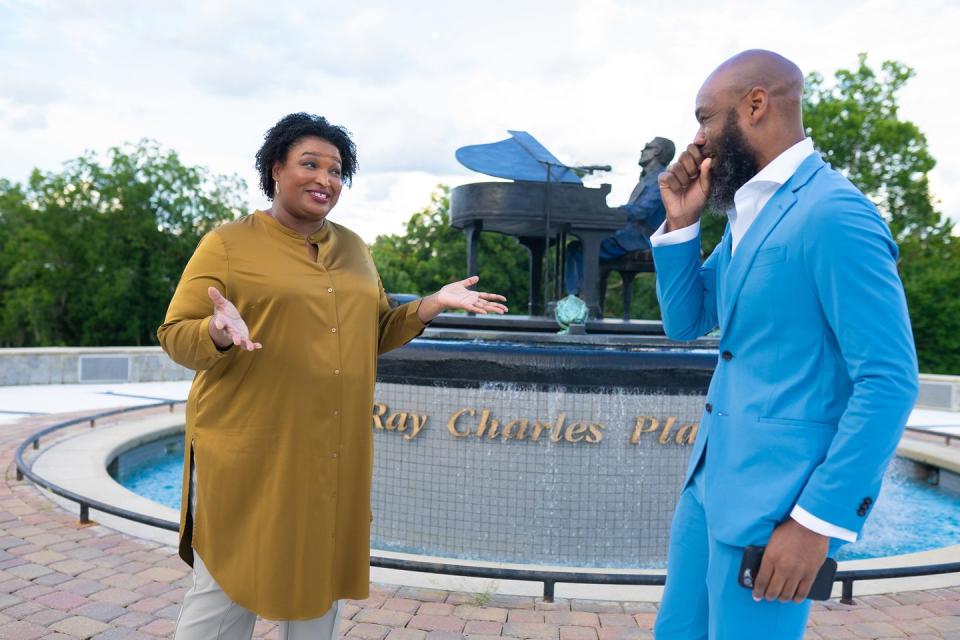
Overcoming Barriers
When I first began covering Abrams back in 2018, getting interviews with her was pretty easy, and she was fairly liberal with her time. Few people—especially in national political circles—believed she could win the Democratic primary, let alone the governorship. In fact, others thought Stacey Evans or “the white Stacey,” her 2018 primary opponent, was a more suitable opponent. (White women tend to be put on pedestals of deep-pocketed cash, no matter how often and badly they lose.) Abrams would go on to obliterate Evans with more than 76 percent of the vote. This time around, no one dared to run against her in the Democratic primary. National magazines vie to feature her on their covers, and her campaign can’t keep up with the media requests.
Yet, she is behind in the polls, several of which show her trailing by several points, even with a margin of error. For all the local and national acclaim she has earned over the past four years, some observers believe many voters aren’t ready for a candidate like her.
“Sadly there are still some voters who cannot conceptualize a Black woman as the leader of the state,” said Christina Greer, a professor of political science at Fordham University in New York City, who covers Black female politicians. “Abrams has proven she can raise money, build coalitions, and work across the aisle; however, the voter disenfranchisement of Black voters in Georgia, especially, will be an impediment to a free and fair election in November.”
For example, Republican lawmakers here passed legislation that bars groups from serving food and drinks to folks waiting in line to vote, a move widely regarded as targeting people of color voters who vote blue. (A federal judge recently upheld the law.) A 2013 SCOTUS ruling that removed stipulations requiring states to get federal approval before changing local election laws has made such laws easier to pass. Moreover, at least 214 polling stations in predominantly Black areas of the state have closed in Georgia since 2012.
“Most voters are unaware of the new barriers to absentee ballots, polling location changes, the elimination of Sunday voting in some areas, among other impediments,” Lauren Groh-Wargo, Abrams’s campaign manager told me. “Worse, thousands of voters may not have the information they need to fully participate in a close election. It is clear Kemp is counting on voter confusion and suppression to aid him in winning this election.”
When I asked her if she sees herself as an underdog, without hesitation, Abrams said she was. But her supporters haven’t lost a modicum of optimism about her chances to win, primarily because she didn't stop working for the people of Georgia after 2018. At her last campaign stop on a Saturday afternoon in July, she walked into a packed youth community center in Albany, where locals, many of whom took pride in seeing her for their second or third time, waited to see her speak.
One of them was Tiffany Terrell, who came to thank her for supporting her business with a small grant during the height of Covid-19. Terrell was on local television talking about how hard it was to get financial support for A Better Way Grocers, which provides residents in food deserts with access to fresh groceries. Someone from Abrams’s camp saw the news clip and reached out to Terrell. “After she didn’t win, she still came back and helped the community and created safety net programs,” Terrell said. “Too often, after they lose, they go back to business as usual.” Terrell said she is especially moved to see a Black woman navigating the travails of Georgia’s white-male political power structure with such grace and bravery. “As a Black woman myself, it lets me know that I can do it,” she added. “The opportunities she’s creating, pathways for other Black women like myself to do different things in our community. The sky’s the limit.”
Abrams is a woman of incredible faith and will need all the prayer hands the state of Georgia can muster if she is to win. Though she has run a near-flawless campaign, she’s running against a governor who is literally rigging the system against her. No one would have blamed her had she sat this one out. She knows she is a Black woman from the South running against a power structure and an incumbent in an election year that historically has not benefited people who look like her. She told me she is running to lift up communities that have historically been not only marginalized and disadvantaged but discounted. Anytime you are trying to do more for those who are considered less, you’re the underdog, but that doesn’t mean that’s where you have to stay, she told me.
In fact, being the underdog emboldens her resolve to inspire more women like Terrell who see her perseverance as a spark for their own push to change Georgia for the better.
If she wins in November, Abrams isn’t shy about saying that she will set her eyes on the White House. Her self-assuredness reminds me of something an activist friend, Darnell Moore, said about how centuries of oppression have suppressed many Black folks’ capacity to dream, to see something that feels out of reach but, if you keep at it, can actually be acquired. We’ve been conditioned to settle because dreaming isn’t practical. Or, in her circumstances, too dangerous to pursue.
Abrams told me that she isn’t built to settle for anything other than fulfilling the totality of her dreams.
“When you decline to embrace ambition, you not only deny others a sense of what they’re capable of, you give people permission to say to everyone else, ‘You can’t have it, because no one else can.’ So I answer the question directly because I mean it,” she said. “But more importantly, because I know what it feels like to not see someone who looks like me who has my experiences and story. And I want young Black women, girls, people to see me and think, I can do that. She may not be what we are taught to believe leadership looks like, but by God, hasn’t she done it.”
You Might Also Like

